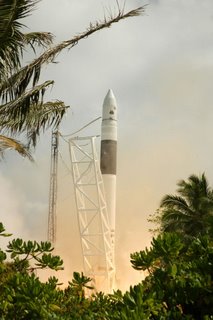5.16.2006
SpaceX Dismissal Redux
 It was a good try, but Judge Cooper remained unconvinced by SpaceX's tenacious attempt to "overcome the constitutional deficiencies that plague its claim" against Boeing and Lockheed for alleged antitrust violations.
It was a good try, but Judge Cooper remained unconvinced by SpaceX's tenacious attempt to "overcome the constitutional deficiencies that plague its claim" against Boeing and Lockheed for alleged antitrust violations.SpaceX's second amended complaint, (2006 WL 819759 C.D.Cal.) (March 9, 2006) fired its rockets but did not fly. On May 11, the court, without hearing oral argument, and "with prejudice" (which means no more bites of the antitrust apple for SpaceX, at least at the district court level in this case) granted defendants' motions to dismiss the complaint for lack of jurisdiction and failure to state a claim.
As did the initial pleading, this second amended complaint alleged violations of section 1 and 2 of the Sherman Act, section 7 of the Clayton Act, as well as Racketeer Influenced and Corrupt Organizations Act, along with Rico conspiracy, violations of the Cartwright Act (unreasonable restraint of trade and conspiracy to monopolize), and violations of section 17200 of the California Business & Professions Code.
As widely noted, it remained iffy whether there was any way to overcome defendants' successful motions to dismiss; see, Judge Cooper's order tossing out the first amended complaint, which, as many have noted, she wrote before the failed March 24th Falcon 1 launch. And yes, the judge did make note of the launch failure in this second dismissal, even citing a Wall Street Journal article about the event. Specifically, the court found, "SpaceX's failure to launch an EELV-class vehicle does not preclude it from being considered a competitor but it is a relevant factor in the evaluation." (Footnote 7.)
And in the end, SpaceX's arguments that it was a full-fledged or a potential competitor of Boeing and Lockheed or that defendants' conduct caused the company injury or competitive disadvantage proved unavailing.
Elon Musk did not mention the antitrust case in his talk this month in Los Angeles at the space development conference. But as The Space Review reports, after the Falcon 1 launch attempt, the space entrepreneur and his bold company "remain publicly as committed as ever to developing vehicles that will reduce the cost of space access for both satellites and humans." And SpaceX's litigation strategy appeared to reflect the company's go for launch attitude. Indeed, pure perseverance can take a business far -- in space, but not always in court. However, as we await an inevitable successful Falcon launch, in court, at least, there's always the right to an appeal.
(Note: Thank you to Ann Barnard at Westlaw for copyright permission here.)






